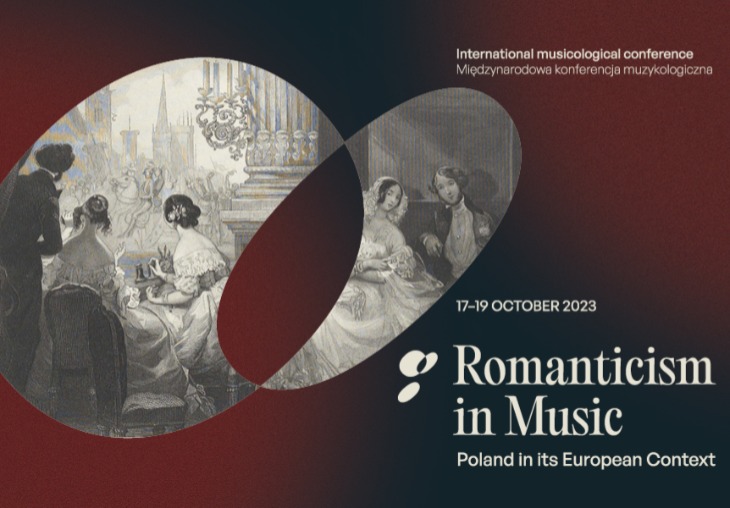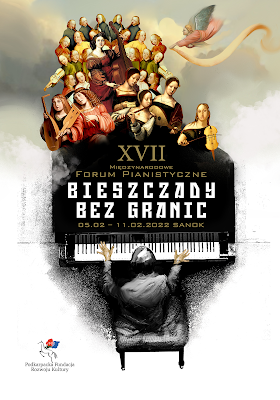International Musicological Conference 17–19 October 2023, Warsaw - Romanticism in Music: Poland in its European Context

Romanticism in Music: Poland in its European Context
17–19 October 2023, Warsaw
When we try, at least in the most general way, to look at the landscape of nineteenth-century music, and thus – romantic music, we notice its heterogeneity, its internal, innate diversity, and its contrasts. ‘Romanticism’ is a term that has been well researched in literature and the visual arts, while in music the meanings it carries, and even the time frames of it, are different and not strictly defined.
The aim of the conference was to raise the subject that allows to highlight the issue of musical romanticism from many points of view and thus to get closer to the essence of this trend in the history of European music. We were not trying to create a definition of romanticism, but to explore selected, particularly important, issues related to that era.
Therefore, the programme committee encouraged submissions within the following areas:
1. The meaning of romanticism in purely instrumental music
2. Romantic programme music
3. The references of opera to instrumental music
4. Relationship between music and the word; intersection of music and literature – Lied; vocal lyric
5. The paths of the idea of romanticism reaching Poland, Fryderyk Chopin’s exposure on ideas of romanticism
All proposed papers fell within the ambit of frameworks limiting the subject matter:
Temporal: first half of the 19th century
Geographical: Poland, Germany, France, Italy, England
The Scholarly Committee finalized its selections:
There were additions and subtractions as a result of illness but the ones I attended I have highlighted
2) Otis Beasley Chopin’s Vocabulary of Verbal Markings in the Light of Contemporary Polish Musical Glossaries and Their European Contexts
3) Michał Bruliński Fenomen fortepianu w polskiej beletrystyce I poł. XIX w.: casus Ignacego Platona Kozłowskiego i Andrzeja Janowicza [The phenomenon of the piano in Polish belles-lettres of the first half of the nineteenth century: the case of Ignacy Platon Kozłowski and Andrzej Janowicz]
The was a remarkably interesting paper of how the piano, music lessons and performance was observed and described in the Polish social context in non-aristocratic circles by two observant Polish writers (Ignacy Platon Kozłowski and Andrzej Janowicz) during Chopin's time. A revelation of behavior and standards compared to our time and our view of Chopin as teacher to the aristocracy!
4) Marta Gabryelczak-Paprocka Dobór tekstów literackich w europejskich pieśniach autorstwa kobiecego w I połowie XIX wieku. Analiza i interpretacja kulturowa na przykładzie wybranych utworów Fanny Mendelssohn, Marii Szymanowskiej oraz Sophie Gail [The choice of literary texts in European songs by women composers during the first half of the nineteenth century. An analysis and cultural interpretation based on selected works by Fanny Mendelssohn, Maria Szymanowska and Sophie Gail]
5) Zbigniew Granat From Schubert’s Agitation to Chopin’s Apotheosis: The Romantic Heart in Nocturne in C-Minor, Op. 48 No. 1
6) Dylan Henderson ‘Espaces Imaginaires’ and the Romantic Imagination: Chopin’s Damper Pedal and the Haze of Dreams
Johnathan Bellman 'Chopin dreams of Hamlet' Delivered by Halina Goldberg owing to the writer's illness
A surprising and fascinating paper on the effect on Chopin of Shakespeare and a performance of Hamlet with special 'cinematic' reference to the G-minor and F-minor Ballades and their possible subconscious inspiration. There was an atmosphere both romantic and revolutionary at the time. After seeing Hamlet Chopin answered a question concerning the effect on his music by Shakespeare with an important remark 'Let the listeners surmise for themselves' Hamlet as an indecisive character was equated with the Mickiewicz Konrad Wallenrod - the accepted dramatic focus described in the G-minor Ballade.
7) Ewa Hoffmann-Piotrowska „Udomowiony romantyzm” – Chopin i kultura warszawskiego biedermeieru [‘Domesticated romanticism’: Chopin and the culture of Warsaw Biedermeier]
I found this a particularly interesting excursion further afield from the purely Chopin keyboard music and more penetration into the historical social environment. Warsaw at this time offered many opportunistic for social advancement taken advantage of by Nicholas Chopin, the composer's father. Chopin himself was an urban soul, grew up in a bourgeois environment and did not want to spend time living in the countryside - visits and holidays yes, but not work. Hence his fascination with Paris, Vienna and Berlin. Biedermeier was an artistic style as well as a mental, moral attitude encapsulating admirable bourgeois values (protestant work ethic, making savings, charity work and so on).
8) John Hoffmeyer Palimpsest Dialectics: The Poetics of Translation in Schumann’s Liederkreis, Op. 39
9) Izabela Jutrzenka-Trzebiatowska Grande Valse Brillante op. 18 Fryderyka Chopina w kontekście nowych prądów w muzyce europejskiej [Fryderyk Chopin’s Grande Valse Brillante, Op. 18 in the context of new trends in European music]
10) David Kasunic “The Jena Romantics, Chopin, and the Musical ‘Invention of Self’: Revisiting Robert Schumann’s Reviews of Fryderyk Chopin’s Music”
I had been reading a remarkable newly published book entitled Magnificent Rebels - The First Romantics and the Invention of the Self by Andrea Wulf (John Murray, London, 2022). The thesis here is that the mind rather than political revolution of 1790 effectively took place in Jena (near Weimar in the Duchy of Saxe-Weimar) and not Paris. The Jena Set were the first Romantics that set in motion a revolution of philosophical thought and sensibility. This paper was an extension of this idea..
11) Małgorzata Komorowska Teatralność romantycznych oper – w zgodzie czy w sprzeczności z estetyką muzyki Chopina [The theatricality of romantic operas – in keeping or at odds with the aesthetics of Chopin’s music]
James Parakilas 'A morphology of consciousness narratives in Romantic instrumental music'
This eminent musicologist based much of his lecture on a truly enlightening analysis of the transitional implications of Schumann's Piano Trio Op.1 No.1. He emphasized the altered states of consciousness ('The flimsiest of screens' according to William James) in the Chopin Polonaise-Fantasie. In this paper he emphasized the importance of the transitional from 'grounded' (Polonaise) to the 'dream' or 'magical realms' (lyrical sections). 'The musical fantasy of a mental fantasy' as he put it. He emphasized the musical importance of the accompaniment, that takes one into a realm at times beyond the melody, which listeners may become exclusively obsessed with.
Halina Goldberg 'Spirits inhabiting the unfathomable world: Chopin and Romantic idealism in Jozef Sikorski's Recollections of Chopin'
12) Marcin Kostecki Romantic expression within Classical constraint: a case study of Chopin's Prelude in B-flat major, Op. 28, No. 21
13) Alicja Kozłowska-Lewna A Renaissance artist of the Romantic era – Napoleon Orda
14) Li Kwen-Yin The Poetic as an Aesthetic Category of Romantic Music
15) Leong Sio Pan Exploring the Threshold between Dreaming and Waking in Franz Schubert’s Music
16) Annie Mondegreen Emilia Giuliani-Guglielmi and the Romantic Guitar
17) Myung Jin Oh Chopin’s Piano Music as Phonocentrism
18) Magdalena Oliferko-Storck Polish Paris: The Soundscape of «la petite Pologne» in 1830s and 1840s
19) Tiziana Palandrani Chopin and slavic myths
20) Arabella Pare Schubert’s Fragmentary Aesthetic and Roman Ingarden’s Intentional Object: Romantic Aesthetics in the Fragmentary Sonata in F sharp Minor D 571
21) James Sobaskie Evolution of the nocturne: Gabriel Fauré’s Opus 36
22) Małgorzata Sokalska & Ryszard Daniel Golianek Idea zbawiającej kobiecości w operze romantycznej [The idea of redeeming femininity in Romantic opera]
23) Krzysztof Teodorowicz Do genezy Ballady As-dur Fryderyka Chopina [On the genesis of Fryderyk Chopin’s Ballade in A flat major]
24) Monika Woźniak Działalność E.T.A. Hoffmanna na ziemiach polskich w kontekście kształtowania się idei romantyzmu w muzyce [The work of E. T. A. Hoffmann in Polish lands within the context of the forming of Romantic ideas in music]
25) April Wu Disclosing the Amorous Subject in Dichterliebe: The Example of ‘Wenn ich in deine Augen seh’
26) Sławomira Żerańska-Kominek Chopin’s interpretations of Witwicki’s songs
Conference languages
Conferences will be conducted in English and Polish.
Organiser:
Narodowy Instytut Fryderyka Chopina
Tamka 43
00-355 Warsaw
Poland
Conference venue
Institute of Art of the Polish Academy of Sciences
Długa 26/28
00-238 Warsaw
Poland
International Academic Committee:
Zofia Chechlińska (Narodowy Instytut Fryderyka Chopina)
Maria Cieśla-Korytowska (Uniwersytet Jagielloński)
Halina Goldberg (Indiana University)
Jeffrey Kallberg (University of Pennsylvania)
Irena Poniatowska (Uniwersytet Warszawski)
Jim Samson (Royal Holloway University of London)
Kamila Stępień-Kutera (Narodowy Instytut Fryderyka Chopina)
Artur Szklener (Narodowy Instytut Fryderyka Chopina)



Comments
Post a Comment